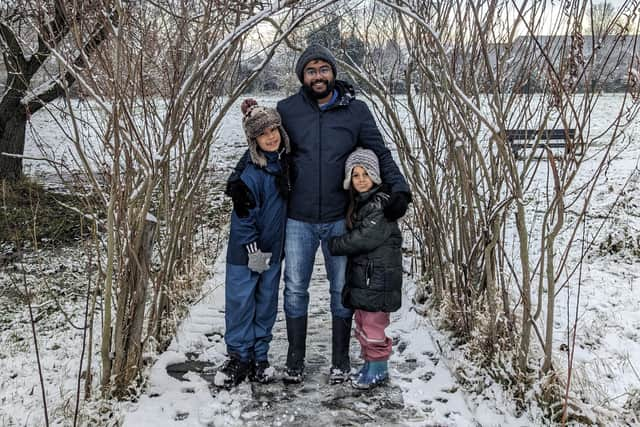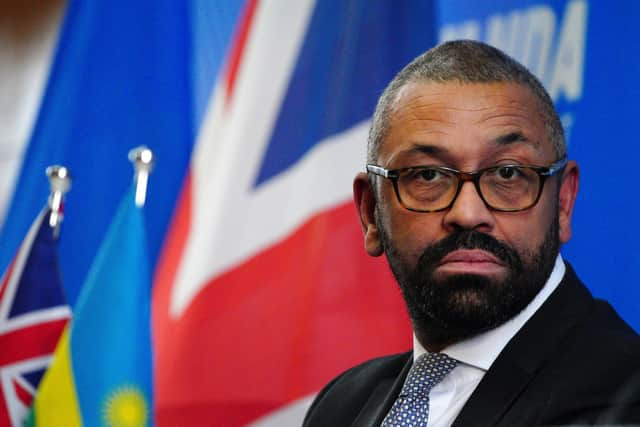Migration rules UK: 'It feels like we're being continually punished', says family of new immigration rules
When Jessica Mason heard the announcement the UK Government had increased the minimum income requirement required to apply for a spousal visa, the worry immediately set in.
Her husband, Sanas Sahib, was granted leave to remain in the UK earlier this year and was reunited with his two young children after ten months of separation. But the family is not clear whether the new requirements will also apply to people already living here.
Advertisement
Hide AdAdvertisement
Hide AdUnder new measures aimed at restricting immigration, home secretary James Cleverly on Monday unveiled plans to increase the minimum income for family visas from £26,200 to £38,700. He is also set to hike the skilled worker earnings threshold by a third to £38,700, in line with the median full-time wage.


Mason said: “We are we now facing the risk of not meeting those requirements and having to do a human rights application [to keep Mr Sahib in the UK], we don't know. Not knowing is quite profound. It just feels for us like this has been going on forever.”
The family is also not clear as to whether, if required to prove the higher level of financial support, they will be able to use their combined incomes – something that is allowed for people on a “further leave to remain”, but not an option for those applying for the first time from outside the country.
Sahib, a chef, is employed in a Michelin-starred restaurant, while Mason teaches English online. However, neither of them individually earn the £38,700 threshold amount.
"This is the third set of big changes this year,” she said. “It's very easy to say ‘you can combine your income’. But what if they changed that? We can't meet that. And then does he get deported? We both work, we both contribute to society.


“It just feels like we're being continually punished. The stress is always hanging over you like ‘oh, can I use that money for that, or is something going to happen where they're going to increase this again?’ You have residual trauma from those experiences.”
Mason and Sahib met in his native Dubai when they were in their 20s.
"We met, we got married and we had our son,” she said. “We decided to move to Sri Lanka for a few years, then our daughter was born there.”
Advertisement
Hide AdAdvertisement
Hide AdWhile the family was living in Sri Lanka, however, the country became engulfed in an economic downturn and ensuing political crisis. An economic emergency was declared and food shortages hit – and the UK Government issued a travel warning for Sri Lanka.
"We had 15-hour power cuts and we had no medicine,” she said. “So I came back to the UK last April with our two children. We initially applied for a visitor visa for Sanas, as we thought the situation might calm down and we would go back, but we soon realised I needed to stay with the children.”
Mason – and the couple’s two children, Tariq, nine and Layla, four – ended up being separated from Sahib for ten months. Mason did not meet the financial requirements due to Sri Lanka’s economic situation and the need to work around her children’s childcare requirements – and was forced to apply using “third-party support” from family members.
An initial application for Sahib to live in the UK was turned down after their situation was not deemed to be “exceptional” enough to use third-party financial support – and was only overturned after Mason launched a petition and raised the family’s case on social media.
"I couldn't meet the financial requirements,” she said. “It just was not possible as a single mother in the UK, even though then, we were talking about a much lower amount of money.
"If these changes had happened a year ago, before we applied, it would have been an even bigger problem. I would hopefully have still been able to do it, as we borrowed money from my mum, but it would have been even harder. I feel so sorry for anyone who's just starting to go through this now because I don't think they have a chance. It's impossible.”
Caroline Coombs, chief executive of Reunite Families UK, said: “Our community of couples and families have been utterly devastated by the intended increase to the MIR. The Government repeatedly ignore the sufferings that the policy has already have caused at its current threshold and which continues to cause countless unnecessary damage to British citizens and their families across the country.
"The emotions are strong within the community, but this has galvanised people into action. Threatening your family life will do that to a person. We will use this energy to supercharge this fight for a better and more humane immigration system”.
Advertisement
Hide AdAdvertisement
Hide AdAnnouncing the changes on Monday, Cleverly said: “It is clear that net migration remains far too high. By leaving the European Union, we gained control over who can come to the UK, but far more must be done to bring those numbers down so British workers are not undercut and our public services put under less strain.
“My plan will deliver the biggest ever reduction in net migration and will mean around 300,000 people who came to the UK last year would not have been able to do so. I am taking decisive action to halt the drastic rise in our work visa routes and crack down on those who seek to take advantage of our hospitality.”
Comments
Want to join the conversation? Please or to comment on this article.
